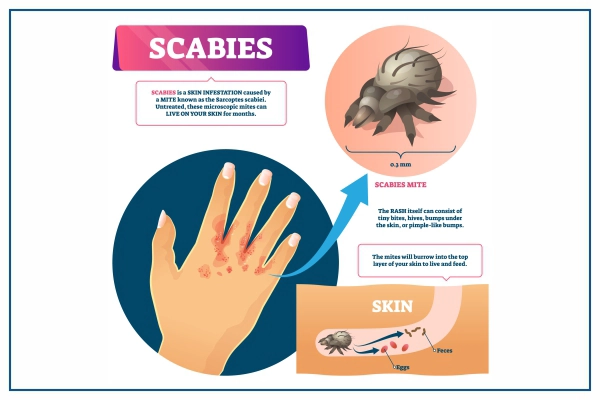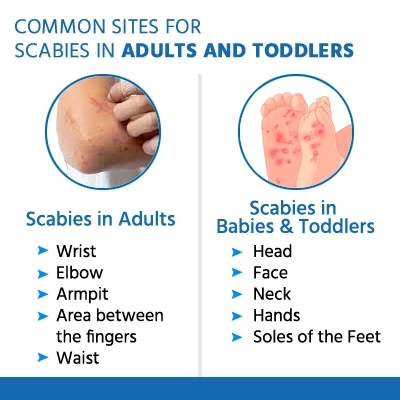What is Scabies?
Scabies is an itchy skin disorder that is caused by tiny burrowing mites called Sarcoptes scabiei. The place where the mite burrows cause severe itching. Scratching may be particularly strong at night. Scabies is contagious and spread rapidly in a family, child care group, school class, nursing home, or prison through close physical contact. Scabies is so contagious that doctors frequently advise treating entire families or contact groups. Scabies is easily treatable. Scabies-causing mites and their eggs are killed by medications applied to the skin. However, you may experience irritation for several weeks following treatment.

Symptoms of Scabies
Scabies signs and symptoms include:
- Itching, often severe and usually worse at night
- Thin, irregular burrow tracks made up of tiny blisters or bumps on your skin
The burrows or tracks typically appear in folds of skin. Though almost any part of the body may be involved, in adults and older children scabies is most often found:
- Between the fingers
- In the armpits
- Around the waist
- Along the insides of the wrists
- On the inner elbows
- On the soles of the feet
- Around the breasts
- Around the male genital area
- On the buttocks
- On the knees

In infants and young children, common sites of infestation usually include the:
- Scalp
- Palms of the hand's
- Soles of the feet
If you've had scabies before, you'll notice signs and symptoms within a few days of being exposed. If you've never had scabies before, it can take up to six weeks for symptoms to appear. Even if you don't have any signs or symptoms, you might still spread scabies.
When To See a Doctor?
Visit a doctor once you notice discomfort on your skin, any kind of burning sensations, early symptoms of scabies, or if you came in direct contact with a person suffering from ringworm infection.
Get the best treatment for scabies and skin disorders from the best Dermatologists and skin experts at Medicover Hospitals.
Causes And Risks Factors
Scabies is caused by an eight-legged mite that is tiny. The female mite burrows just under your skin and creates an egg-laying tunnel. The eggs hatch and the mite larvae make their way to the surface of your skin, where they mature and spread to other parts of your body or to other people's bodies. The allergic reaction of your body to the mites, their eggs, and their excrement causes scabies itching. Close personal contact with an infected person, as well as the sharing of clothing or bedding, can spread the mites.
Animals and people are also afflicted by different types of mites. Each species has a chosen host and does not live far from that host.
Contact with the animal scabies mite can cause a transient cutaneous reaction in humans. However, unlike interaction with the human scabies mite, people are unlikely to develop full-blown scabies from this source.
Prevention
Take the following precautions to avoid re-infestation and the dissemination of the mites to other people:
Clean all of your clothing and linens. Wash any clothing, towels, and bedding used within three days after starting treatment in hot, soapy water. High heat is used to dry. Items that can't be washed at home are dry cleaned.
Feed the mites. Place stuff you can't wash in a sealed plastic bag and store it somewhere out of the way, like your garage, for a couple of weeks. After a few days without nourishment, mites die.
Diagnosis
Scabies is diagnosed by physical examination by your doctor who examines your skin for evidence of mites, such as the telltale burrows. When your doctor finds a mite burrow, he or she may scrape a sample of your skin and analyze it under a microscope. The existence of mites or their eggs can be determined through microscopic examination.
Treatment
Scabies therapy entails using drugs to eradicate the infestation. A doctor's prescription is required for some creams and lotions. Your doctor will probably tell you to apply the drug all over your body, from your neck down, and leave it on for at least eight to ten hours. Some treatments require a second application, and if new burrows and a rash occur, treatments must be repeated.
Because scabies is so easily spread, your doctor will almost certainly recommend treatment for all members of your household and other close contacts, even if they show no indications of scabies.
Scabies medications which are commonly recommended include -
Cream containing permethrin - Scabies mites and their eggs are killed by permethrin, a topical treatment containing chemicals. Adults, pregnant women, and children aged 2 months and up are typically regarded as safe.
Ivermectin is a kind of insecticide (Stromectol) - For those with weakened immune systems, crusted scabies, or those who don't respond to prescribed lotions and creams, doctors may give this oral treatment. Ivermectin is not indicated for pregnant or breastfeeding women or children under the age of 33 pounds (15 kilograms).
Although these drugs quickly eliminate the mites, you may discover that the itching continues for several weeks.
For patients who don't respond to or can't utilize these treatments, doctors may prescribe alternative topical medications, such as sulfur mixed in petrolatum.
Lifestyle changes and a home remedies
Itching may last a long period after the mites have been killed by medicine. These steps might help you stop scratching:
- Allow your skin to cool and soak - Itching can be reduced by soaking in cool water or taking an oatmeal bath, or by using a cool, moist washcloth to irritating regions of your skin.
- Use a calming lotion - Calamine lotion, which is accessible without a prescription, can successfully treat small skin irritations' pain and itching.
- Antihistamines can help - You may discover that over-the-counter antihistamines ease the allergic symptoms caused by scabies if your doctor recommends them
Do’s and Don’ts
Scabies spread more easily, hence to stop it spreading to other members of the family, follow some dos and don’ts so that it does not spread or increase.
| Do’s | Don’ts |
| Take bath 2 times a day. | Don’t be embarrassed to visit a dermatologist. |
| Apply the ointment prescribed by the doctor. | Don't self medicate for scabies. |
| Keep your infected area clean and dry. | Don't share your clothes, towel, blankets etc. |
| Maintain cleanliness in your surrounding | Don't touch kids or their things with infected hands. |
| Regularly wash your garments, bed sheets and towel. | Don’t scratch or rub the infected area. |
Care at Medicover Hospitals
At Medicover Hospitals, we have the most trusted team of doctors, skin experts, dermatologists, and medical experts who are experienced in providing excellent healthcare services to our patients. Our dedicated team of experts, trained nurses and other paramedical staff offer the best care to a patient. We make use of advanced medical technology and state-of-the-art facilities for the diagnosis of conditions and treatment of health disorders. For the treatment of Scabies, we have an experinced team of dermatologists and infectious disease experts who diagnose and treat this condition with utmost precision that brings successful treatment outcomes.
